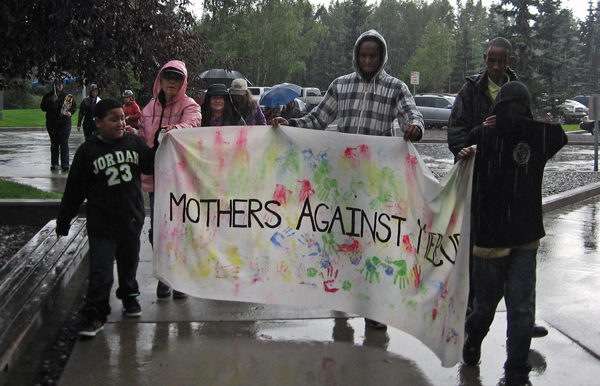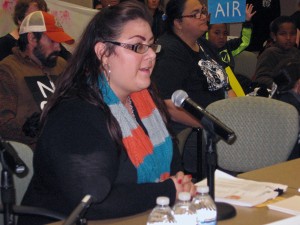
Numerous coal development projects are slated for lands in the Matanuska Valley that are owned by the Alaska Mental Health Trust.
Some Anchorage and Valley residents are concerned about mercury poisoning linked to coal development, and on Wednesday, they aired their concerns before the board of directors of the Alaska Mental Health Trust Authority.
Pam Miller, who heads Alaska Community Action on Toxics [ACAT] says that a recent report indicates that mercury found in Pacific Ocean fish has a fingerprint from coal plants in Asia. Miller says that proposed Alaska coal development projects aim at shipping the coal produced to Asian markets. Many of the proposed coal development projects are on land owned by the Alaska Mental Health Trust.
On Wednesday, Miller, and a group of protestors staged a demonstration at the Alaska Mental Health Trust building. Later, Miller testified before a Trust Authority board meeting

“A new study from the University of Michigan and the University of Hawaii implicates coal burning power plants in Asia for contamination of deep water ocean fish from the Pacific with mercury through isotopic fingerprinting of mercury sources. This is a brand new study. The health hazards of mercury are well known to you. Exposure causes developmental disorders in children including learning disabilities, impairment of mental abilities, memory and motor functions, cerebral palsy. Shouldn’t the Mental Health Trust Authority do everything in its power to prevent this harm? The core of medical ethics is first, do no harm. Please divest from coal. It’s destructive cycle is antithetical to your mission,” Miller said.
A number of Alaskans, who belonged to the group Mothers Against Mercury, gave comments similar to Miller’s. Jamie Duhamel is an anti-coal activist living in Sutton, near three proposed coal mines.
“I totally understand the good works that you are doing, both as individuals and as an agency. I understand your fiduciary responsibility to this board, and I understand your social responsibility to the people of Alaska. What I continue to be confused about, is where you stand on your moral responsibility to the people who will be directly affected by an industry, a coal mining extraction and burning industry, that is located right next to our homes. This is an industry that can increase the number of mental health clients that you serve,” Duhamel said.
The Alaska Mental Health Trust Authority is a state corporation that administers Alaska Mental Health Trust funds on behalf of Trust beneficiaries. Trust resources are used to fund mental health, and drug and alcohol recovery programs throughout the state.
Jeff Jesse, Chief Executive Officer of the Mental Health Trust Authority, says the Trust only owns the subsurface under some of the Trust lands, and that limits the Trust’s options on use of the land.
“We understand their concern about the health impacts of mining, which is why the Trustees are committed that both the Trust and our licensees will comply with all the permitting and environmental requirements are in place to ensure that this type of development is done in a environmentally safe and responsible way,” Jesse said.
Others at the board meeting complimented the Mental Health Trust Authority on the work of the Alaska Brain Injury Network, which is funded by the Mental Health Trust. Paul Cornils says he suffered a brain injury in April
“It was the, and continues to be one of the most frightening experiences I have ever gone through. At the beginning of April, I had complete memory loss, I would wake up in the morning, and I didn’t know where I was, I didn’t recognize my family. I was frightened, constantly. Toward the end of April, I started getting a little bit better, and I remembered the Brain Injury Network, and we went and they gave me more practical advice, and my wife, and more reassurance and hope in a couple of hours than we received from all of the professionals that we paid tens and tens of thousands of dollars to,” Cornils said.
Jeff Jesse says that coal development so far has not added a great deal to the Trust’s revenues, although he could not say how much. Although Trust lands are leased for coal exploration and development, coal mining permits are approved by the state Department of Natural Resourses division of mining, land and water’s coal regulatory program.
APTI Reporter-Producer Ellen Lockyer started her radio career in the late 1980s, after a stint at bush Alaska weekly newspapers, the Copper Valley Views and the Cordova Times. When the Exxon Valdez ran aground in Prince William Sound, Valdez Public Radio station KCHU needed a reporter, and Ellen picked up the microphone.
Since then, she has literally traveled the length of the state, from Attu to Eagle and from Barrow to Juneau, covering Alaska stories on the ground for the AK show, Alaska News Nightly, the Alaska Morning News and for Anchorage public radio station, KSKA
elockyer (at) alaskapublic (dot) org | 907.550.8446 | About Ellen




